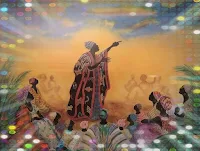Characteristic Features of Oral Literature
The Characteristic features of oral literature include the following:
Actual performance
Oral Literature involves the live presentation of an oral literature piece e.g. the narration of a story, singing, drama etc.
In the performance of oral literature, the narrator has the opportunity to exploit the techniques of delivery i.e. he uses gestures, variation of voices and the prevailing situation as an effective means of presenting his oral material improvisation and original composition.
The actual performance of oral literature involves the processes that go on during the performance. This performance depends on the ability of the artist to recreate or bring in new ideas or actions to enhance his performance.
Originality during the performance of oral literature emphasizes the artist’s ability to bring out something new and original that can be said to be his own effort.
During the performance of oral literature, the narrator can introduce variations on older pieces i.e. detailed wording, structure or content.
Verbal variability
Verbal variability in oral literature is the performer’s manner of expression to give beauty and interest to his piece of oral literature. This includes a variation of voice e.g. use of stylistic devices like ideophone, the imitation of voices of characters appearing in narratives etc.
Applicability of oral pieces.
Applicability of oral literature pieces implies that pieces of oral literature are made relevant to the time they are told and the bearers.
The Objects developed in the time of narration are used by the narrator.
New elements are also introduced into the oral piece e.g. names of people, places.
This is common owing to the tendency of narrators to apply circumstances of their environment to their narrations.
The artist
In the oral tradition, the freedom of the artist is enhanced.
Each narrator employs his own style which may be a spontaneous activity, he speaks freely and is not bound by the expression used by the person who taught him the tale.
In oral literature, the artist is not bound by literary conventions as in the case in written literature. It is as a result of this that several versions of the same story may be found in the same community or society.
It is difficult to find narrators following exactly the same order in telling a story for example. They arrange material as they see fit.
Oral Literature Content is altered often due to oral transmission.
The audience
The audience is an essential factor in the realization of oral literature.
This is because the audience is directly involved in the actualization and realization of oral literature pieces.
The artist may be more … or …less receptive to the audience’s reaction.
The narrator may exploit or be influenced by the face to face confrontation with the audience.
He may influence the audience directly e.g. in story-telling situations the narrative may choose a formula that arouses the interest of the audience.
The audience of an oral narrative may be expected to participate in narration and in particular in a song included in a narrative.
In oral poetry, the poet acts as a lead singer while his audience performs the chorus.
The artists’ expression may be affected by the reactions of the audience.
-The type of audience may affect the presentation of a piece of oral literature e.g. obscenities, certain types of jokes or complex found forms that may be omitted to suit child, religious audiences.
Direct references to the characteristics, behaviour or fortunes of particular listeners may be included in oral literature with great effectiveness.
An audience should not be passive, listeners may break into the performance by asking questions, adding or criticizing. Members of the audience may clarify, challenge.
Occasion.
The Actual occasion of the presentation of the oral literature piece may affect the detailed content and form of the piece.
Oral literature pieces may be composed on the occasion of their actual utterance.
Oral Songs/poems often arise from occasions such as weddings funerals, victory, work etc.
Proverbs, for example, may sometimes be considered in terms of their appropriateness to the occasion.
Oral pieces also tend to be affected by such factors as the general purpose and atmosphere of the gathering at which they are rendered, recent episodes in the mind of the narrator, audience or community

